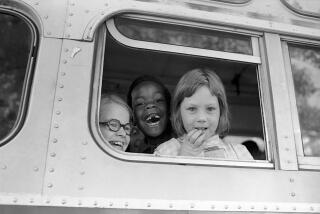For Schools, Apartheid Takes Toll
- Share via
JOHANNESBURG, South Africa — Every weekday morning, thousands of Johannesburg’s black children climb into buses and taxis to go to segregated schools in black townships up to 40 miles away.
Under South Africa’s apartheid race policies, the children are not allowed to attend the “whites-only” schools of Johannesburg, which, like other South African cities, has no state-run schools for the country’s black majority.
Strictly speaking, the pupils are not even supposed to live in Johannesburg. They are part of a nationwide, illegal influx of blacks into “white” urban areas, which the authorities tolerate.
The children’s long trip to school is only one of many inequities of a segregated school system that businessmen say cripples economic development and perpetuates racial strife.
“Where people of different ‘colors’ live together, it would make sense to allow their children to attend the same school so that the school will reflect the residential environment,” said educator Franz Auerbach.
That message may be getting through to Pretoria, which for decades said segregated education was non-negotiable policy.
Last month, Piet Clase, then Education Minister for Whites, said that he might fund multiracial schools in places declared a “free settlement area” under promised reforms relaxing residential apartheid.
Top businessman Gavin Relly, chairman of the giant Anglo-American conglomerate, said in a speech that South Africa desperately needed skilled manpower and spoke of “the great damage wrought by apartheid in education.”
Many blacks want integrated education.
“Most black readers say the simple solution to the ‘race problem’ is for all children to start schooling together,” wrote Joe Latakgomo, a senior black journalist on Johannesburg’s The Star newspaper.
Spending on white pupils, 11% of the school population, absorbs about 40% of the education budget, according to 1987 official figures.
More to Read
Sign up for Essential California
The most important California stories and recommendations in your inbox every morning.
You may occasionally receive promotional content from the Los Angeles Times.










